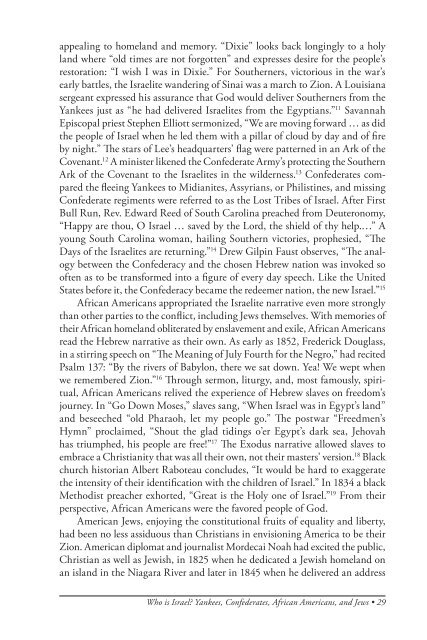American Jewish Archives Journal, Volume 64, Numbers 1 & 2
American Jewish Archives Journal, Volume 64, Numbers 1 & 2
American Jewish Archives Journal, Volume 64, Numbers 1 & 2
You also want an ePaper? Increase the reach of your titles
YUMPU automatically turns print PDFs into web optimized ePapers that Google loves.
appealing to homeland and memory. “Dixie” looks back longingly to a holy<br />
land where “old times are not forgotten” and expresses desire for the people’s<br />
restoration: “I wish I was in Dixie.” For Southerners, victorious in the war’s<br />
early battles, the Israelite wandering of Sinai was a march to Zion. A Louisiana<br />
sergeant expressed his assurance that God would deliver Southerners from the<br />
Yankees just as “he had delivered Israelites from the Egyptians.” 11 Savannah<br />
Episcopal priest Stephen Elliott sermonized, “We are moving forward … as did<br />
the people of Israel when he led them with a pillar of cloud by day and of fire<br />
by night.” The stars of Lee’s headquarters’ flag were patterned in an Ark of the<br />
Covenant. 12 A minister likened the Confederate Army’s protecting the Southern<br />
Ark of the Covenant to the Israelites in the wilderness. 13 Confederates compared<br />
the fleeing Yankees to Midianites, Assyrians, or Philistines, and missing<br />
Confederate regiments were referred to as the Lost Tribes of Israel. After First<br />
Bull Run, Rev. Edward Reed of South Carolina preached from Deuteronomy,<br />
“Happy are thou, O Israel … saved by the Lord, the shield of thy help.…” A<br />
young South Carolina woman, hailing Southern victories, prophesied, “The<br />
Days of the Israelites are returning.” 14 Drew Gilpin Faust observes, “The analogy<br />
between the Confederacy and the chosen Hebrew nation was invoked so<br />
often as to be transformed into a figure of every day speech. Like the United<br />
States before it, the Confederacy became the redeemer nation, the new Israel.” 15<br />
African <strong>American</strong>s appropriated the Israelite narrative even more strongly<br />
than other parties to the conflict, including Jews themselves. With memories of<br />
their African homeland obliterated by enslavement and exile, African <strong>American</strong>s<br />
read the Hebrew narrative as their own. As early as 1852, Frederick Douglass,<br />
in a stirring speech on “The Meaning of July Fourth for the Negro,” had recited<br />
Psalm 137: “By the rivers of Babylon, there we sat down. Yea! We wept when<br />
we remembered Zion.” 16 Through sermon, liturgy, and, most famously, spiritual,<br />
African <strong>American</strong>s relived the experience of Hebrew slaves on freedom’s<br />
journey. In “Go Down Moses,” slaves sang, “When Israel was in Egypt’s land”<br />
and beseeched “old Pharaoh, let my people go.” The postwar “Freedmen’s<br />
Hymn” proclaimed, “Shout the glad tidings o’er Egypt’s dark sea, Jehovah<br />
has triumphed, his people are free!” 17 The Exodus narrative allowed slaves to<br />
embrace a Christianity that was all their own, not their masters’ version. 18 Black<br />
church historian Albert Raboteau concludes, “It would be hard to exaggerate<br />
the intensity of their identification with the children of Israel.” In 1834 a black<br />
Methodist preacher exhorted, “Great is the Holy one of Israel.” 19 From their<br />
perspective, African <strong>American</strong>s were the favored people of God.<br />
<strong>American</strong> Jews, enjoying the constitutional fruits of equality and liberty,<br />
had been no less assiduous than Christians in envisioning America to be their<br />
Zion. <strong>American</strong> diplomat and journalist Mordecai Noah had excited the public,<br />
Christian as well as <strong>Jewish</strong>, in 1825 when he dedicated a <strong>Jewish</strong> homeland on<br />
an island in the Niagara River and later in 1845 when he delivered an address<br />
Who is Israel? Yankees, Confederates, African <strong>American</strong>s, and Jews • 29
















